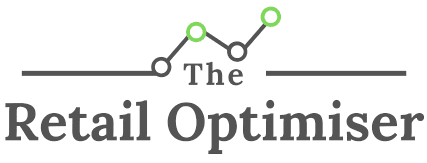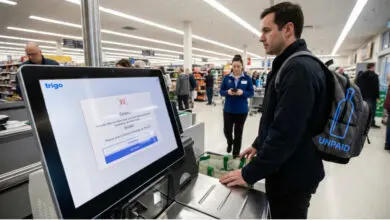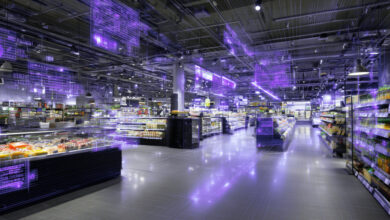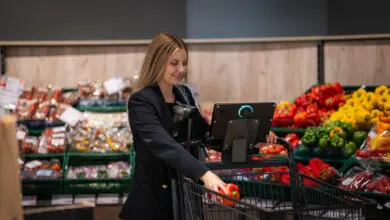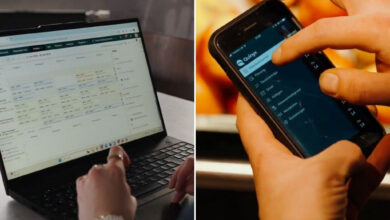Reta Award 2023: The best technology solutions in European retail
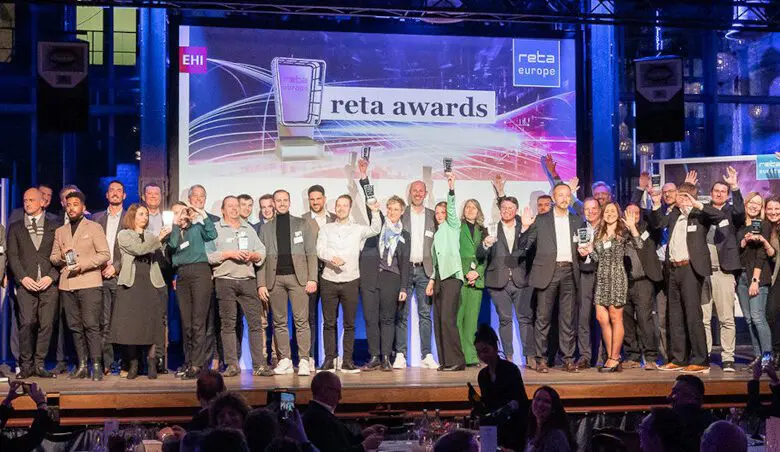
For the 16th time, EHI Retail Institute this week announced the winners of the Retail Technology Awards Reta. The eight-member international jury of the award includes Retail Optimiser editors Björn Weber and Joachim Pinhammer as well as the publisher of the British trade magazine Retail Technology, Miya Knights.
The award ceremony took place during EuroShop 2023 at Dr Thompson’s Soap Factory in Düsseldorf. Three equal prize winners were honoured in each of the following five categories: Best Customer Experience, Best Enterprise Solution, Best Instore Solution, Best Connected Retail Solution and Best AI and Robotics Application.
Aldi Nord with Trigo
Aldi Nord’s first cashierless store in Utrecht uses computer vision technology with Trigo and does without traditional payment terminals or self-checkout points. The Retail Optimiser reported. This has been made possible by AI technology and an app: sensors in the shelves as well as cameras on the ceiling record all movements of the products and assign them to the customers – in compliance with all data protection standards. When entering the store, customers check in via QR code, and when leaving, the QR code is scanned again.
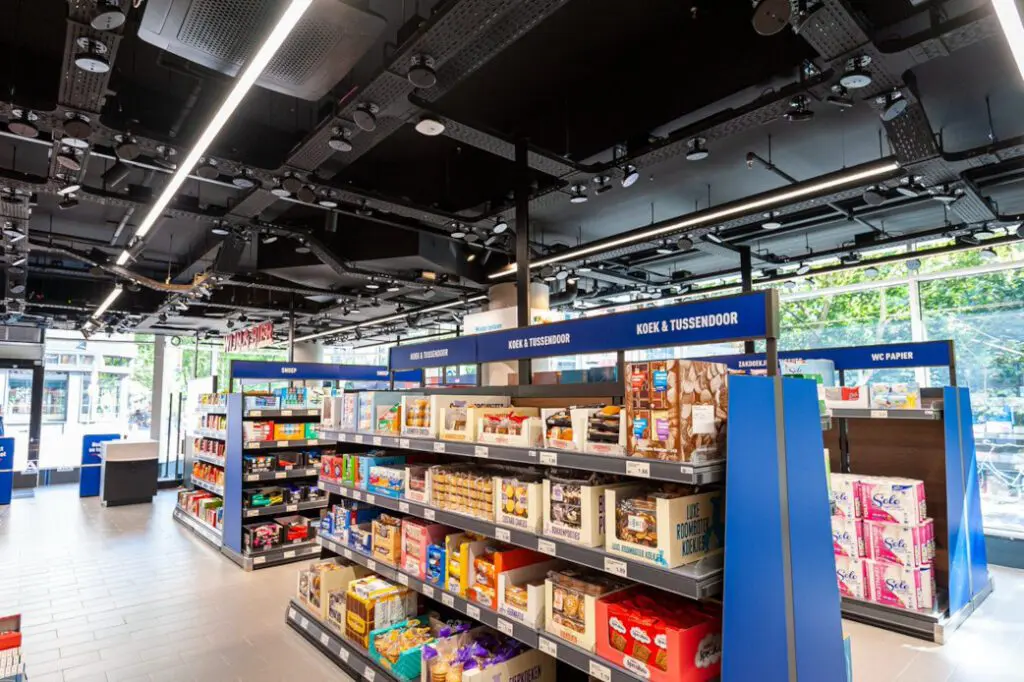
Coop Switzerland with GK
Via the customer card of the loyalty programme Coop Supercard, the company uses the relevant shopping information for individual product recommendations on the website. The Retail Optimiser reported. In addition, the retailer introduced My Coop, a personalised online supermarket in mid-2022, where customers can find the products they prefer through a targeted configuration on a landing page. The technology for the personalised areas is provided by GK Artificial Intelligence for Retail AG.
Esprit with CAS AG
With the help of CAS AG, Esprit has brought the store processes of all its stores in Europe to mobile devices in such a way that employees can work with the data from the central SAP system in real time in an extremely user-friendly way. This has made the previous store merchandise management system obsolete. The new uniform view of current stock is an essential prerequisite for Esprit to further optimise its processes in order to be able to use real-time inventory management in the area of omnichannel services, among other things.
With the new application, employees on the floor can also easily access item information including the current price. The fact that the respective product is displayed with a picture in all processes in the apps makes the employees’ work considerably easier and results in faster and more efficient processing of the processes, as the articles can be identified more quickly with the help of the product picture.
CAS AG implemented the store solution with SAP Fiori Apps technology. The consultants developed the apps very specifically along Esprit’s desired processes themselves. “The CAS AG team actually managed to implement all our requirements in SAP Fiori Apps,” Alissa Schlüter, Esprit Director Retail Operations EU, told Retail Optimiser.
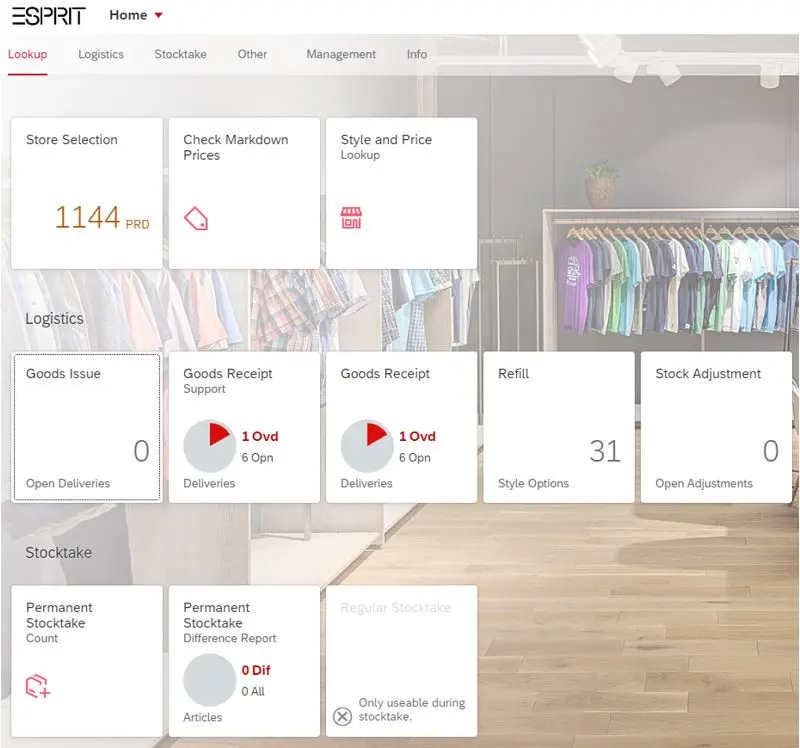
Shufersal with Shopic
Israeli grocer Shufersal has introduced an AI-based clip-on device that can be plugged into any type of shopping cart. The tool automatically detects added or removed items. The screen displays a summary of products, special offers and the prices. The device also allows users to checkout on their own.
Edeka Digital with Thinkport and Solace
Edeka Digital has implemented a cloud-based event streaming and management solution to stream master data across its stores and supply chain. The PubSub+ platform helps the grocer distribute master data more efficiently in real time across stores, data centres and cloud services. This way, product details from an ERP system are merged with images from a legacy system and the changes are passed on to different target projects.
Schwarz IT with G2K Group
Schwarz IT has installed G2K Group’s AI-based platform Parsifal to simplify the IT infrastructure of Schwarz Group companies. The aim is to bundle the numerous, different and isolated individual solutions. The platform brings together all the different technologies and use cases in one interface and thus enables a standardised, international roll-out of the projects. The use cases can be switched on or off for individual sectors depending on local requirements.
Telefónica with Umdasch, Ledcon Systems and Serviceplan Bubble
The Visible Net campaign promotes the 5G network of O2, the core brand of Telefónica Deutschland. In the course of this, Telefónica transformed the entire storefront window of an O2 store in Berlin with a semi-transparent LED wall. A motion sensor and a programme specially developed for this purpose recognise passers-by and let them interact automatically with the 5G network, with the network lines following their steps or stopping when they do.
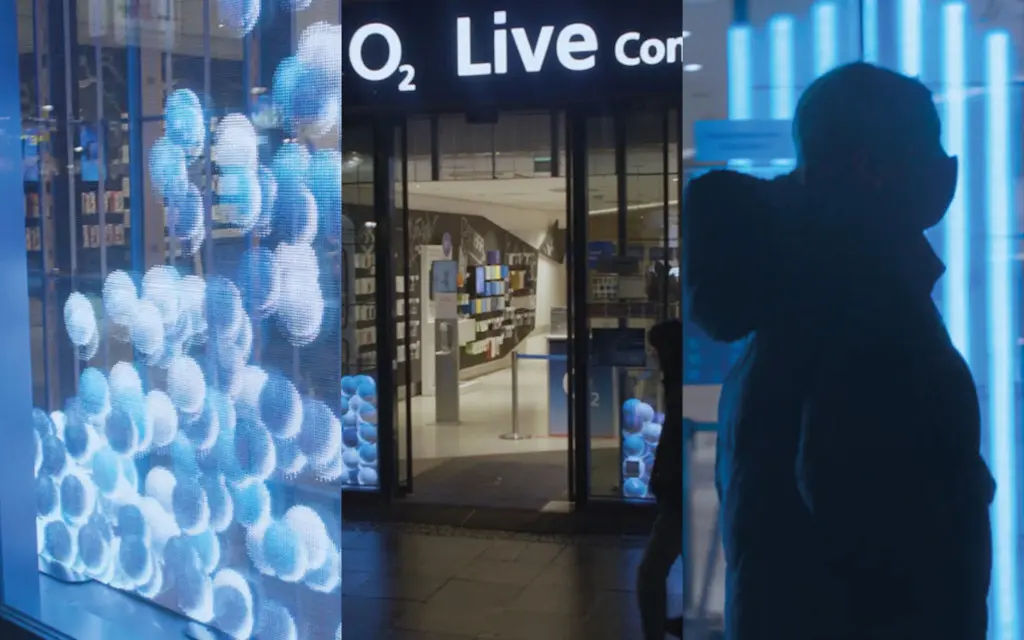
Carrefour with Digi France, HL Display and Mayam
French grocer Carrefour has introduced motion-sensing technology, in which a motion sensor detects loose goods such as fruit. When the desired item is taken from the shelf, the motion sensor transmits the PLU code to the scale. The customer only has to confirm the purchase on the scale’s display and can then buy the desired quantity unpacked. The solution enables Carrefour to reduce selection errors and merchandise losses and simplify the weighing process.
Bizim Toptan with Obase and Microsoft
The Turkish wholesale shop Bizim Toptan offers deliveries and Click & Collect via its homepage. For this purpose, the retail company, together with project partners Obase and Microsoft, implemented a data-driven forecasting system based on machine algorithms that decides on stock levels. One of the goals is to accurately predict which products will be in particular demand. In addition, planned activities on special occasions such as the start of school or Ramadan are to be better predicted.
Edeka Aschoff with KBST and Expresso
Edeka Aschoff has launched the SmartShopper digital shopping trolley together with technology partners KBST and Expresso. The trolley is equipped with a tablet PC. With the associated barcode scanner, customers can add goods to their shopping list. To pay, users generate a QR code on the device and scan it at the checkout. A scale on the shopping trolley checks the items. An intelligent system behind it recognises the weight of the products via an algorithm with an accuracy of two grams.
Adidas with Sensormatic Solutions and Clickit
Sporting goods manufacturer Adidas, together with project partner Sensormatic Solutions and Clickit, developed various touchpoints for stores that identify consumer movements from the street, at the window or in certain zones in the store. The sports retailer wants to accurately track the movements of its clientele in order to be able to adapt music and images to customer behaviour. In the process, the company also wants to attract new members for the Adi-Club benefits programme.
Marks & Spencer with Givex and Diebold the Nixdorf
With regard to digital customer experiences, Marks & Spencer has renewed the ordering options within its gastronomy concept. The basis for the ordering process is a software solution from Givex with which customers can pay via app. Diebold Nixdorf has introduced a kitchen management system for the preparation of meals. The kitchen was equipped with new hardware. After ordering, customers take a food tracker with them to the table so that the staff can deliver the food directly to the guest.
Footwear retailer Meyer with Scalerion
Together with partner Scalerion, Schuhhaus Meyer has introduced a cloud-based marketplace solution. With the solution, the footwear retailer just needs to order a sample collection from suppliers and can thus significantly reduce storage and handling costs. Customers can try on the item in the store and order it home via QR code.
MediaMarktSaturn with Coma
Together with partner Coma, MediaMarktSaturn developed the internal gamification platform LaLiga, where employees from all over Germany and other countries can compete as a store team against other stores. The aim is to score points by selling products and product-related services in order to win against other stores. The participating employees should thus gain a better understanding of the products and increase the quality of advice.
Compass Group with Aifi
Compass Group developed an autonomous checkout for its grocery shop Market x Flutter with partner Aifi. The shop offers fresh meals as well as drinks and confectionery. Customers check in via QR code at the entrance. The AI-based camera technology does not use facial recognition and instead creates virtual avatars for customers. When they leave the shop, they automatically receive a receipt on their mobile phone.
